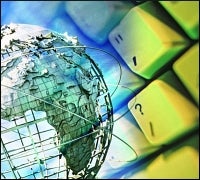 |
Fears that demand in emerging markets for Dell and HP products will slow in the remainder of the year — and that the U.S. dollar will strengthen — may overshadow earnings in line with or above Wall Street targets, analysts say.
HP and Dell, the world’s No. 1 and 2 personal computer makers, should deliver solid numbers in their quarterly earnings, with notebook sales likely leading growth, analysts said. Key to that success is their performance outside the United States, where the credit crunch, a deteriorating housing market and other economic troubles have crimped consumer spending.
Analysts expect HP (NYSE: HPQ) on Tuesday to report third-quarter fiscal 2008 earnings before items of $2.11 billion, or 84 cents a share on revenue of $27.4 billion, according to Reuters Estimates. Dell, which reports (NASDAQ: DELL) on Aug. 28, is projected to post second-quarter fiscal 2009 earnings before items of $721.4 million, or 36 cents a share, on revenue of $15.9 billion, according to Reuters Estimates.
“Despite an increasingly difficult enterprise spending environment in the U.S. and parts of Europe, reasonable growth expectations, strength in emerging countries, currency, and product cycles should be enough to drive some upside for each company,” Goldman Sachs analyst David Bailey wrote in a note to clients earlier this month.
Goldman said HP and Dell should at least meet Wall Street expectations.
So far, countries like Brazil, Russia, India and China — the “BRIC” nations — have held up global sales for HP, Dell and many other big technology companies. Any slowdown there, with no sign of a larger economic recovery in the United States, could pressure future performance this year.
“They’re … very high-growth economies, but they’re still subject to volatility,” said Jayson Noland, an analyst at Robert W. Baird & Co.
“I think China’s just kind of a ‘who-knows?’ It’s so hot, it has to come down eventually,” he said. “Even if China goes from 25 percent to 15 percent year-over-year growth, it can cause some volatility.”
Noland said that 70 percent of HP’s revenue comes from non-U.S. sales.
The Shanghai Composite Index is down about 50 percent this year, and No. 4 PC maker Lenovo Group, based in China, is facing slowing earnings growth as it copes with weaker demand there following a devastating earthquake earlier this year.
Even so, Richard Kugele of Needham & Co., was one of a number of analysts who forecast a good quarter.
“You’re going to hear notebooks doing well for both companies,” Kugele said.
[cob:Special_Report]Additionally, he cited the potential benefits of HP’s $13.2 billion planned acquisition of technology outsourcing company Electronic Data Systems (NYSE: EDS), which it is buying to better compete with International Business Machines (NYSE: IBM).
“I think that HP continues to be very upbeat about what it can do with EDS and will go to great lengths on the conference call to convince people of that.”
Goldman Sachs analyst David Bailey told clients in a research note earlier this month that non-U.S. markets likely contributed to strength in the most recent quarter.
“Share gains on the inkjet side combined with stronger emerging market growth on the laser side should drive another quarter of mid-single digit revenue growth in printers and operating margin above 15 percent,” Bailey wrote. “Even against a tough comparison, we expect HP to maintain double-digit PC revenue growth on strength outside of the U.S.”
Outlook key
Wall Street will be watching whether the strength wanes.
Recent strengthening of the U.S. dollar is making many nervous about overseas sales. “If it does continue to strengthen, you could see some of that be a headwind to top-line growth,” Kugele said.
In the United States, many companies have pinned their troubles on fallout from the housing crisis and credit crunch. Investors tracking HP’s and Dell’s domestic businesses will be looking out to see whether those problems continue.
“The U.S. is obviously still a very important region for these companies,” said American Technology Research analyst Shaw Wu. “People know it’s weak, but does it get worse? … I would argue even the U.S. business has not been as bad as people have said.”


